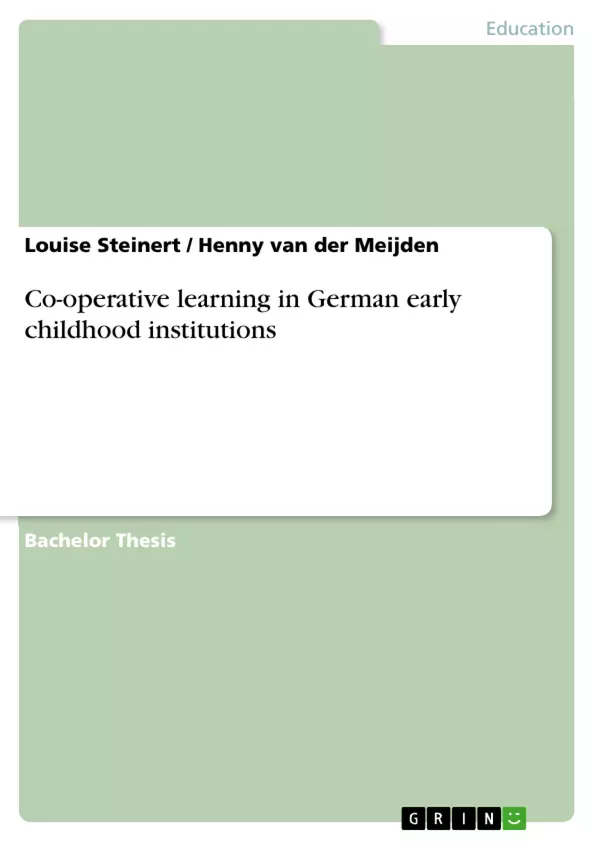Co-operative learning is widely recognised as a pedagogical practise that promotes learning and socialisation. Although there are many different forms of co-operative learning, consensus exists among the researchers about its positive effects on the student achievement. Numerous of studies that have been published over the past three decades could prove and demonstrate that forms of co-operative learning have benefits for the intellectual development and child’s social gains. Co-operative learning affects the ability to construct knowledge and to build inter-group relations, enhances the child’s self-esteem, and promotes the child’s problem-solving skills (Liu, 1992). Research (Slavin,1995) on co-operative learning has further indicated that cooperative learning improves students’ attitude toward school, learning and others. In fact, Johnson and Johnson who are well-known for their research in this field, argue that there may be no other pedagogical practises that simultaneously achieve such diverse outcomes.
Most of the research took place in the range of primary school up to high school, but it is interesting to examine how co-operative learning can be used and is used in the early childhood institutions, especially in the German kindergarten. Over the years, early childhood education has stressed the importance of co-operative learning for the young child’s development, and it is proved that the early learning of cooperative skills produce a long lasting effect and increase the probability of children’s success throughout their school years (Lui, 1992).
In spite of knowing the benefits and the positive effectiveness for the child’s development, co-operative learning is not a common practise in schools for several reasons. Educators are confused about what cooperative learning is, are not well-educated in the techniques and have a lack of discipline to implement the basics of co-operative learning in the classroom.
Inhaltsverzeichnis (Table of Contents)
- Introduction
- Methods
- Results
- Discussion
- References
Zielsetzung und Themenschwerpunkte (Objectives and Key Themes)
This study aims to explore the attitudes and practices of early childhood teachers regarding co-operative learning in German kindergartens. The research investigates the extent to which teachers understand and implement co-operative learning techniques, their perceptions of its benefits, and any perceived limitations or problems associated with its application.
- Early childhood teacher's attitude towards co-operative learning.
- The definition of co-operative learning and the extent to which teachers are trained in its techniques.
- The suitability of co-operative learning as a pedagogical practice in early childhood institutions.
- The relationship between teachers' attitudes towards co-operative learning and its implementation in early childhood institutions.
- The perceived benefits and limitations of applying co-operative learning in the classroom.
Zusammenfassung der Kapitel (Chapter Summaries)
Introduction
The introduction highlights the widespread recognition of co-operative learning as a pedagogical practice that promotes both learning and socialisation. The positive effects of co-operative learning on student achievement are discussed, citing various studies that have demonstrated its benefits for intellectual development, social gains, self-esteem, and problem-solving skills. The importance of co-operative learning in early childhood education is emphasized, along with its potential for long-lasting positive effects on children's academic success.
Overview of Co-operative Learning
This section explores the inherent nature of cooperation in human life and its crucial role in education. It emphasizes the need to teach social skills and the importance of co-operation in navigating a complex world. The concept of co-operative learning as a pedagogical technique, where students work together in small groups towards a common goal, is introduced. It highlights the positive interdependence among group members and the benefits for individual learning and group achievement.
Theoretical Background
This chapter delves into the theoretical underpinnings of co-operative learning, focusing on the socio-cognitive theory of Jean Piaget. It provides a foundation for understanding the principles and mechanisms behind the effectiveness of co-operative learning in promoting student development.
Schlüsselwörter (Keywords)
Key terms and concepts explored in this study include co-operative learning, early childhood education, pedagogical practices, teacher attitudes, implementation, benefits, limitations, social skills, intellectual development, self-esteem, problem-solving, and the socio-cognitive theory.
Frequently Asked Questions
What is co-operative learning in early childhood education?
It is a pedagogical technique where children work together in small groups toward a common goal, promoting both academic learning and social skills.
What are the benefits of co-operative learning for young children?
It enhances intellectual development, improves self-esteem, promotes problem-solving skills, and helps children build positive inter-group relations.
Why is co-operative learning not common in German kindergartens?
Educators are often confused about the definition, lack specific training in the techniques, or find it difficult to implement the basics in a classroom setting.
How does Piaget's theory relate to co-operative learning?
The socio-cognitive theory of Jean Piaget provides the theoretical foundation, explaining how social interaction and cooperation stimulate cognitive development.
Does early co-operative learning have long-lasting effects?
Yes, studies suggest that learning cooperative skills early in life increases the probability of success throughout a child's school years.
What is positive interdependence?
It is a core element of co-operative learning where group members realize they need each other to succeed, benefiting both the individual and the group.
- Quote paper
- Louise Steinert (Author), Henny van der Meijden (Author), 2006, Co-operative learning in German early childhood institutions, Munich, GRIN Verlag, https://www.grin.com/document/61834



